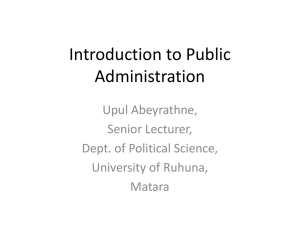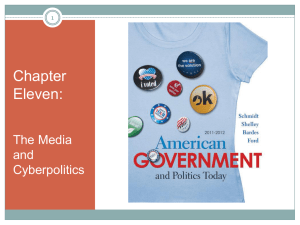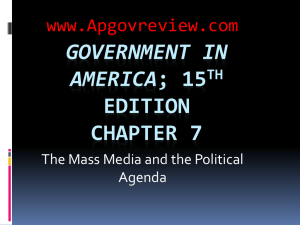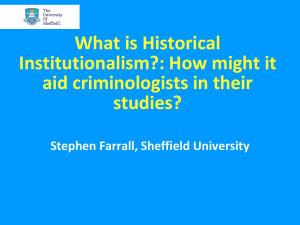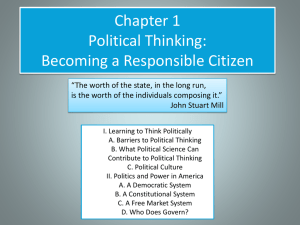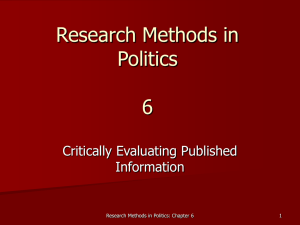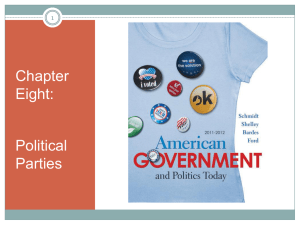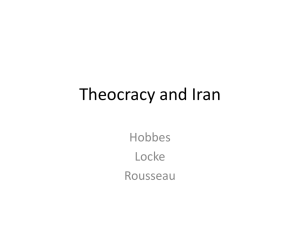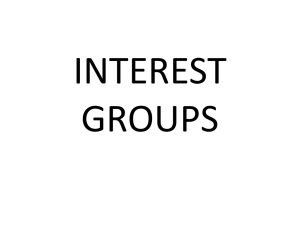STATE DISTINGUISHED FROM GOVERNMENT
advertisement
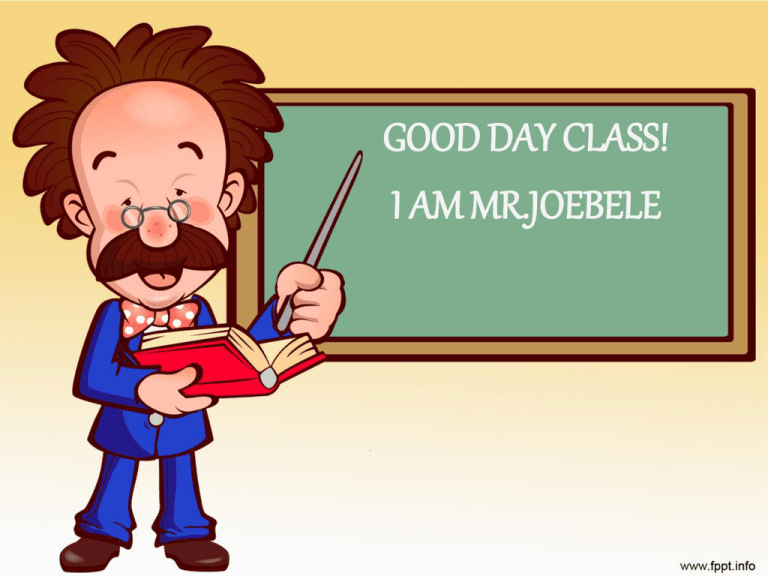
GOOD DAY CLASS! I AM MR.JOEBELE POLITICAL SCIENCE MEANING OF POLITICAL SCIENCE • The term political science is the systematic study of the state and the government • Political Science is a social science regarding the practice and theory of politics, the analysis of political systems, and the study of political behavior. • Political science is the study of politics. Some particular areas that political scientists study include public policy, national politics, political theory, and international relations. ETYMOLOGICAL DEFINITION • Latin – Politicus was an adjective that was used to describe anything “of the state”. “Politics is a fascinating game, because politics is government. It is the art of government.” Harry Truman “I have never regarded politics as the arena of morals. It is the arena of interest.” JOSEPH ESTRADA “Politics is the gentle art of getting votes from the poor and campaign funds from the rich by promising to protect each from the other.” OSCAR AMERINGER SCOPE OF POLITICAL SCIENCE 1. 2. 3. Political Theory-entire body of doctrines relating to the origin, form, behavior and purposes of the state. Public Administration-methods and techniques used in actual management of state affairs. Public Law-limitations upon government authority. FUNCTION AND IMPORTANCE OF POLITICAL SCIENCE “The function of political science is to discover the principles that should be adhered to in public affairs that eventually would serve as a model that can be applied to matters of urgent concern to public officials and to private citizens.” GOALS IN THE STUDY OF POLITICAL SCIENCE 1. Education for citizenship - the primary objective of the political science curriculum is to equip students to discharge the obligations of democratic citizenship GOALS IN THE STUDY OF POLITICAL SCIENCE 2. Essential parts of liberal education - Intelligent, responsible citizenship can save democracy; ignorance and negligence can lose it B. Concepts of State and Government MEANING OF STATE • A state is a community of persons more or less numerous, permanently occupying a definite portion of territory, having a government of their own to which the great body of inhabitants render obedience, and enjoying freedom from external control. • The Philippines is a state. ELEMENTS OF A STATE 1. People - The mass of the population living within the state. ELEMENTS OF A STATE 2. Territory - demarcated area that rightly belongs to the population “territory” • terrestrial, fluvial, maritime and aerial • should be permanent and large enough to be self-sufficing ELEMENTS OF A STATE 3. Government - Refers to the agency to which the will of the state is formulated, expressed, and carried out. ELEMENTS OF A STATE 4. Sovereignty - May be defined as the supreme power of the state to command and enforce obedience to its will from the people within its jurisdiction and corollary to have freedom from foreign control. “sovereignty” a. Internal – power of the state to rule within its territory b. External – the freedom of the state to carry out its activities without subjection to or control by other states. ORIGIN OF STATES 1. Divine right theory-the state is of divine creation and the ruler is ordained by God to govern the people. 2. Necessity or force theory-states must have been created through force by some great warriors. ORIGIN OF STATES 3. Paternalistic theory-under the authority of the father or mother.(stages., next slide) 4. Social contract theory-theory justifies the right of the people to revolt against bad ruler. NATURAL STAGES FAMILY CLAN TRIBE NATION STATE STATE DISTINGUISHED FROM NATION “The state is a political concept while a nation is an ethnic concept.” STATE DISTINGUISHED FROM NATION “ A state is not subject to external control while a nation may or may not be independent of external control.” STATE DISTINGUISHED FROM NATION “ A single state may consist of one or more nations or people and conversely, a single nation may be made up of several states.” STATE DISTINGUISHED FROM GOVERNMENT “…they are usually regarded as identical. As ordinarily, the acts of the government are the acts of the state.” STATE DISTINGUISHED FROM GOVERNMENT “A state cannot exist without a government, but it is possible to have a government without a state.” FORMS OF GOVERNMENT “forms” of government refer to the basic rules by which a nation carries out its policies there is no standard for the classification of governments actual arrangements differ from theoretical ones AS TO NUMBER OF PERSONS EXERCISING SOVERIEGN POWERS a. MONARCHY –supreme and final authority is in the hands of a single person. b. ARISTOCRACY-which political power is exercised by privileged class. c. DEMOCRACY-which political power is exercised by a majority of the people CLASSIFICATIONS OF MONARCHY a. Absolute monarchy- which the ruler rules by divine right. b. Limited monarchy- which the ruler rules in accordance with the constitution. CLASSIFICATIONS OF DEMOCRACY a. Pure democracy-through people in a mass meeting. b. Indirect democracy-select body of persons chosen by the people to act as their representatives. AS TO EXTENT OF POWERS EXERCISED BY THE CENTRAL OR NATIONAL GOVERNMENT a. b. Unitary - control of national and local affairs is exercised by the central or national government Federal –powers of the government are divided between to sets of organs, one of the national and the other for local affairs AS TO THE RELATIONSHIP OF THE BETWEEN THE EXECUTIVE AND THE LEGISLATIVE BRANCHES OF THE GOVERNMENT a. Parliamentary – legislative and executive bodies are fused together b. Presidential – the executive is constitutionally independent of the legislature SO MUCH WILLING TO BE YOUR INSTRUCTOR SOON!! THANK YOU FOR LISTENING AND GOD BLESS



